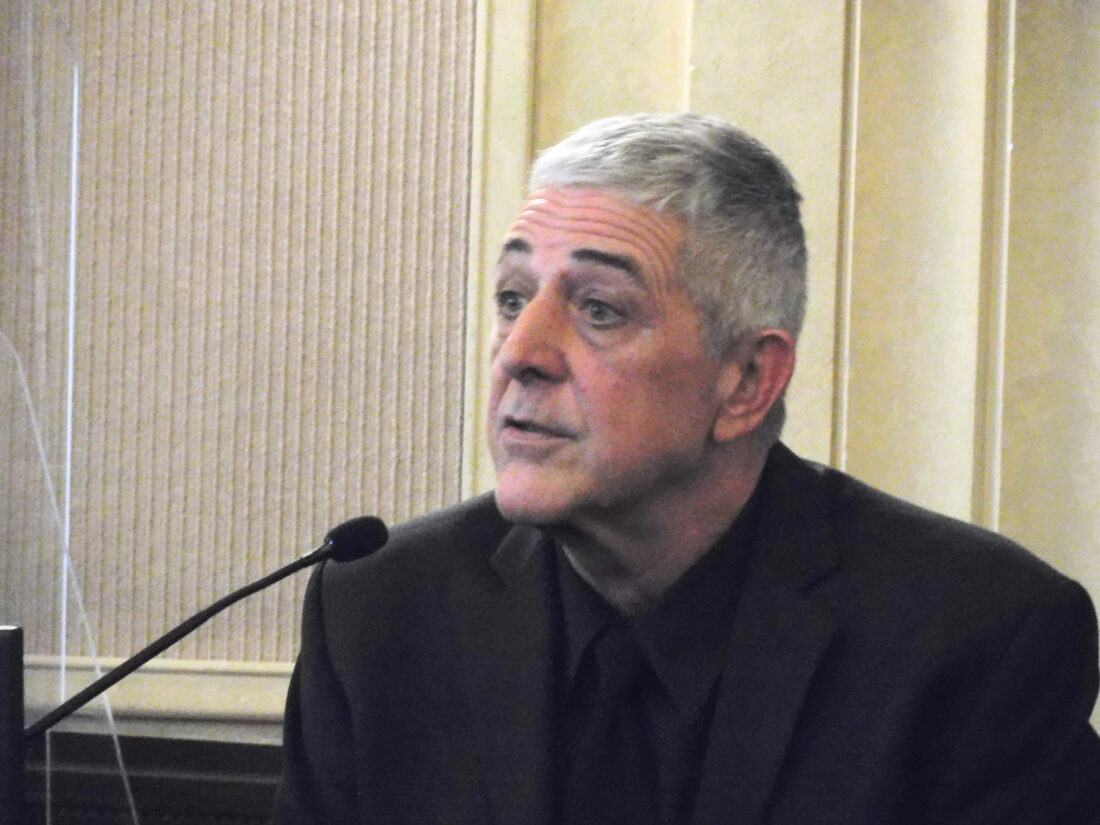Defense DNA expert testifies; Rice case in state of limbo
Judge requests written arguments

Charles Crane/MDN Monte Miller, a forensic scientist and DNA expert, testified during a motion hearing requesting the dismissal of the charge against Nichole Erin Rice for the 2007 murder of Anita Knutson.
The proceedings in the case against the Minot woman accused in the 2007 murder of her then roommate, Anita Knutson, has entered a state of limbo and will remain so for several weeks as North Central District Court Judge Richard Hagar deliberates on a motion to dismiss the case.
Despite Hagar previously ordering for a trial date to be set, the attorneys for Nichole Erin Rice initiated an effort to have the charge dismissed based on an allegation that false information in support of the state’s probable cause was entered into the proceedings during Rice’s preliminary hearing last year.
The backbone of the defense’s call to dismiss came from testimony provided by Monte Miller, a forensic scientist and DNA expert, who said former Minot Police detective Mikalie Talbott falsely stated that Rice, “could not be excluded” as a suspect based on analysis of DNA samples collected from the suspected murder weapon.
Miller explained that the phrasing, “could not be excluded,” meant that an individual being tested could possibly be a contributor for the DNA in question. Miller testified the results from tests performed prior to the hearing and those made available following it actually show Rice was among those excluded.
“In fact, all three reports are pretty much the same. Either the DNA is insufficient and not useful for any comparison purposes, or Nichole was excluded on all three reports,” Miller said. “There’s not just no support, the information in the reports would say that that is false. That’s an inaccuracy.That’s a false statement. Incorrect, however you want to state it.”
When asked by defense attorney Philip Becher whether the court should rely on Talbott’s statement, Miller said, “The DNA report demonstrates why it is false. The court should reject that statement and consider the opposite to be true.”
Deputy State’s Attorney Tiffany Sorgen pressed Miller on his qualifications for commenting on jurisprudence, to which he responded that his testimony was related solely to that of the DNA evidence and the probable cause evidence presented at the preliminary hearing. Miller admitted he had not viewed the notes from the State Crime Lab and said he wasn’t aware of the specific different methods used to generate the 2016 DNA report and the later reports from Intermountain Forensics and the State Crime Lab in 2023.
Sorgen queried Miller regarding differences in methods between the older and newer tests, which included increases in the number of specific regions or loci in tested samples. This type of DNA analysis is based on a side by side comparison between the two samples. Both Miller and state’s witness Amy Gebhardt from the State Crime Lab said that a more limited test could potentially yield less conclusive results than one that compared more loci.
The summation of Sorgen’s argument was that Talbott testified based on the best official knowledge she could have had at that time. Though Sorgen did allude to Talbott’s testimony being based on information that could have been “told to her” by some unknown third party, Miller felt that testimony based on such a scenario would be “unreasonable.” When the question was put to Gebhardt, she testified that she did not know how Talbott learned the information she presented at the preliminary hearing.
However, Becher confirmed with Miller on a redirect that even the subsequent reports released after the preliminary hearing did not support the statement that Rice had not been excluded. Becher also pressed Gebhardt for clarification, and she conceded that anyone saying an individual being excluded or not excluded based on inconclusive data would be stating something that was “false.”
Hagar asked Becher if he required an additional hearing, or would like to submit additional written arguments. Sorgen protested on the grounds that multiple detailed filings have already been made by both parties, including the state, which detail 16 other points of evidence Sorgen believes does meet the lower burden of proof required at preliminary hearings. Sorgen stated that any further time spent on the issue was unnecessary.
“I think this is a matter of law for the court at this point. As set forth in my papers, the defense has the burden at this hearing to prove by a preponderance of the evidence that the allegedly false statements were, in fact, false, made knowingly or intentionally or with reckless disregard for the truth,” Sorgen said. “I don’t think they’ve reached that burden. I don’t think it’s necessary. I think it’s just an additional delay.”
Hagar ruled that Becher would have 10 days to submit his written arguments and the state would have an additional 10 days to respond. No additional hearing date has been scheduled by the court at this time. Barring a dismissal of the charge, Rice’s next scheduled court date is July 15 for the jury trial.




